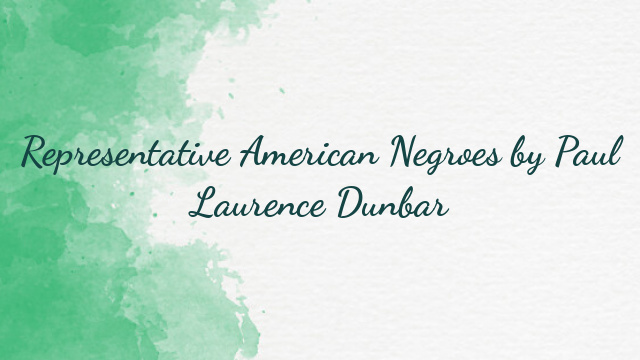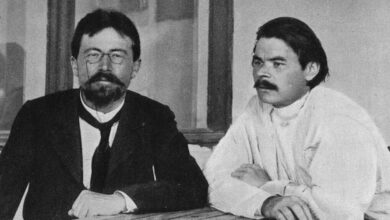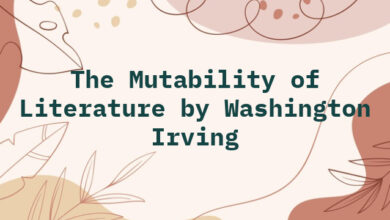
Representative American Negroes by Paul Laurence Dunbar
Dunbar’s essay, Representative American Negroes was published in Booker T. Washington’s book, The Negro Problem (1903).
In considering who and what are representative Negroes there are circumstances which compel one to question what is a representative man of the colored race. Some men are born great, some achieve greatness and others lived during the reconstruction period. To have achieved something for the betterment of his race rather than for the aggrandizement of himself, seems to be a man’s best title to be called representative. The street corner politician, who through questionable methods or even through skillful manipulation, succeeds in securing the janitorship of the Court House, may be written up in the local papers as “representative,” but is he?
I have in mind a young man in Baltimore, Bernard Taylor by name, who to me is more truly representative of the race than half of the “Judges,” “Colonels,” “Doctors” and “Honorables” whose stock cuts burden the pages of our negro journals week after week. I have said that he is young. Beyond that he is quiet and unobtrusive; but quiet as he is, the worth of his work can be somewhat estimated when it is known that he has set the standard for young men in a city that has the largest colored population in the world.
It is not that as an individual he has ridden to success one enterprise after another. It is not that he has shown capabilities far beyond his years, nor yet that his personal energy will not let him stop at one triumph. The importance of him lies in the fact that his influence upon his fellows is all for good, and in a large community of young Negroes the worth of this cannot be over-estimated. He has taught them that striving is worth while, and by the very force of his example of industry and perseverance, he stands out from the mass. He does not tell how to do things, he does them. Nothing has contributed more to his success than his alertness, and nothing has been more closely followed by his observers, and yet I sometimes wonder when looking at him, how old he must be, how world weary, before the race turns from its worship of the political janitor and says of him, “this is one of our representative men.”
This, however, is a matter of values and neither the negro himself, his friends, his enemies, his lauders, nor his critics has grown quite certain in appraising these. The rabid agitator who goes about the land preaching the independence and glory of his race, and by his very mouthings retarding both, the saintly missionary, whose only mission is like that of “Pooh Bah,” to be insulted; the man of the cloth who thunders against the sins of the world and from whom honest women draw away their skirts, the man who talks temperance and tipples high-balls—these are not representative, and whatever their station in life, they should be rated at their proper value, for there is a difference between attainment and achievement.
Under the pure light of reason, the ignorant carpet bagger judge is a person and not a personality. The illiterate and inefficient black man, whom circumstance put into Congress, was “a representative” but was not representative. So the peculiar conditions of the days immediately after the war have made it necessary to draw fine distinctions.
When Robert Smalls, a slave, piloted the Confederate ship Planter out of Charleston Harbor under the very guns of the men who were employing him, who owned him, his body, his soul, and the husk of his allegiance, and brought it over to the Union, it is a question which forty years has not settled as to whether he was a hero or a felon, a patriot or a traitor. So much has been said of the old Negro’s fidelity to his masters that something different might have been expected of him. But take the singular conditions: the first faint streaks of a long delayed dawn had just begun to illumine the sky and this black pilot with his face turned toward the East had no eye for the darkness behind him. He had no time to analyze his position, the right or wrong of it. He had no opportunity to question whether it was loyalty to a union in which he aspired to citizenship, or disloyalty to his masters of the despised confederacy. It was not a time to argue, it was a time to do; and with rare power of decision, skill of action and with indomitable courage, he steered the good ship Planter past Fort Johnson, past Fort Sumter, past Morris Island, out where the flag, the flag of his hopes and fears floated over the federal fleet. And Robert Smalls had done something, something that made him loved and hated, praised and maligned, revered and despised, but something that made him representative of the best that there is in sturdy Negro manhood.
It may seem a far cry from Robert Smalls, the pilot of the Planter, to Booker T. Washington, Principal of the Institute at Tuskegee, Alabama. But much the same traits of character have made the success of the two men; the knowledge of what to do, the courage to do it, and the following out of a single purpose. They are both pilots, and the waters through which their helms have swung have been equally stormy. The methods of both have been questioned; but singularly neither one has stopped to question himself, but has gone straight on to his goal over the barriers of criticism, malice and distrust. The secret of Mr. Washington’s power is organization, and organization after all is only a concentration of force. This concentration only expresses his own personality, in which every trait and quality tend toward one definite end. They say of this man that he is a man of one idea, but that one is a great one and he has merely concentrated all his powers upon it; in other words he has organized himself and gone forth to gather in whatever about him was essential.
Pilot he is, steadfast and unafraid, strong in his own belief,—yes strong enough to make others believe in him. Without doubt or skepticism, himself he has confounded the skeptics.
Less statesmanlike than Douglass, less scholarly than DuBois, less eloquent than the late J.C. Price, he is yet the foremost figure in Negro national life. He is a great educator and a great man, and though one may not always agree with him, one must always respect him. The race has produced no more adroit diplomatist than he. The statement is broad but there is no better proof of it than the fact that while he is our most astute politician, he has succeeded in convincing both himself and the country that he is not in politics. He has none of the qualities of the curb-stone politician. He is bigger, broader, better, and the highest compliment that could be paid him is that through all his ups and downs, with all he has seen of humanity, he has kept his faith and his ideals. While Mr. Washington stands pre-eminent in his race there are other names that must be mentioned with him as co-workers in the education of the world, names that for lack of time can be only mentioned and passed.
W.H. Council, of Normal, Alabama, has been doing at his school a good and great work along the same lines as Tuskegee. R.R. Wright, of the State College of Georgia, “We’se a-risin’ Wright,” he is called, and by his own life and work for his people he has made true the boyish prophecy which in the old days inspired Whittier’s poem. Three decades ago this was his message from the lowly South, “Tell ’em we’se a-risin,” and by thought, by word, by deed, he has been “Tellin’ em so” ever since. The old Southern school has melted into the misty shades of an unregretted past. A new generation, new issues, new conditions, have replaced the old, but the boy who sent that message from the heart of the Southland to the North’s heart of hearts has risen, and a martyred President did not blush to call him friend.
So much of the Negro’s time has been given to the making of teachers that it is difficult to stop when one has begun enumerating some of those who have stood out more than usually forceful. For my part, there are two more whom I cannot pass over. Kelly Miller, of Howard University, Washington, D.C., is another instructor far above the average. He is a mathematician and a thinker. The world has long been convinced of what the colored man could do in music and in oratory, but it has always been skeptical, when he is to be considered as a student of any exact science. Miller, in his own person, has settled all that. He finished at Johns Hopkins where they will remember him. He is not only a teacher but an author who writes with authority upon his chosen themes, whether he is always known as a Negro writer or not. He is endowed with an accurate, analytical mind, and the most engaging blackness, for which some of us thank God, because there can be no argument as to the source of his mental powers.
Now of the other, William E.B. DuBois, what shall be said? Educator and author, political economist and poet, an Eastern man against a Southern back-ground, he looms up strong, vivid and in bold relief. I say looms advisedly, because, intellectually, there is something so distinctively big about the man. Since the death of the aged Dr. Crummell, we have had no such ripe and finished scholar. Dr. DuBois, Harvard gave him to us, and there he received his Ph.D., impresses one as having reduced all life and all literature to a perfect system. There is about him a fascinating calm of certain power, whether as a searcher after economic facts, under the wing of the University of Pennsylvania, or defying the “powers that be” in a Negro college or leading his pupils along the way of light, one always feels in him this same sense of conscious, restrained, but assured force.
Some years ago in the course of his researches, he took occasion to tell his own people some plain hard truths, and oh, what a howl of protest and denunciation went up from their assembled throats, but it never once disturbed his magnificent calm. He believed what he had said, and not for a single moment did he think of abandoning his position.
He goes at truth as a hard-riding old English squire would take a difficult fence. Let the ditch be beyond if it will.
Dr. DuBois would be the first to disclaim the name of poet but everything outside of his statistical work convicts him. The rhythm of his style, his fancy, his imagery, all bid him bide with those whose souls go singing by a golden way. He has written a number of notable pamphlets and books, the latest of which is “The Soul of the Black Folk,” an invaluable contribution to the discussion of the race problem by a man who knows whereof he speaks.
Dr. DuBois is at Atlanta University and has had every opportunity to observe all the phases of America’s great question, and I wish I might write at length of his books.
It may be urged that too much time has already been taken up with the educational side of the Negro, but the reasonableness of this must become apparent when one remembers that for the last forty years the most helpful men of the race have come from the ranks of its teachers, and few of those who have finally done any big thing, but have at some time or other held the scepter of authority in a school. They may have changed later and grown, indeed they must have done so, but the fact remains that their poise, their discipline, the impulse for their growth came largely from their work in the school room.
There is perhaps no more notable example of this phase of Negro life than the Hon. Richard Theodore Greener, our present Consul at Vladivostok. He was, I believe, the first of our race to graduate from Harvard and he has always been regarded as one of the most scholarly men who, through the touch of Negro blood, belongs to us. He has been historian, journalist and lecturer, but back of all this he was a teacher; and for years after his graduation he was a distinguished professor at the most famous of all the old Negro colleges. This institution is now a thing of the past, but the men who knew it in its palmy days speak of it still with longing and regret. It is claimed, and from the names and qualities of the men, not without justice, that no school for the higher education of the black man has furnished a finer curriculum or possessed a better equipped or more efficient faculty. Among these, Richard T. Greener was a bright, particular star.
After the passing of the school, Mr. Greener turned to other activities. His highest characteristics were a fearless patience and a hope that buoyed him up through days of doubt and disappointment. Author and editor he was, but he was not satisfied with these. Beyond their scope were higher things that beckoned him. Politics, or perhaps better, political science, allured him, and he applied himself to a course that brought him into intimate contact with the leaders of his country, white and black. A man of wide information, great knowledge and close grasp of events he made himself invaluable to his party and then with his usual patience awaited his reward.
The story of how he came to his own cannot be told without just a shade of bitterness darkening the smile that one must give to it all. The cause for which he had worked triumphed. The men for whom he had striven gained their goal and now, Greener must be recognized, but—
Vladivostok, your dictionary will tell you, is a sea-port in the maritime Province of Siberia, situated on the Golden Horn of Peter the Great. It will tell you also that it is the chief Russian naval station on the Pacific. It is an out of the way place and one who has not the world-circling desire would rather hesitate before setting out thither. It was to this post that Mr. Greener was appointed.
“Exile,” his friends did not hesitate to say. “Why didn’t the Government make it a sentence instead of veiling it in the guise of an appointment?” asked others sarcastically.
“Will he go?” That was the general question that rose and fell, whispered and thundered about the new appointee, and in the midst of it all, silent and dignified, he kept his council. The next thing Washington knew he was gone. There was a gasp of astonishment and then things settled back into their former state of monotony and Greener was forgotten.
But in the eastern sky, darkness began to arise, the warning flash of danger swept across the heavens, the thunder drum of war began to roll. For a moment the world listened in breathless suspense, the suspense of horror. Louder and louder rose the thunder peal until it drowned every other sound in the ears of the nation, every other sound save the cries and wails of dying women and the shrieks of tortured children. Then France, England, Germany, Japan and America marshalled their forces and swept eastward to save and to avenge. The story of the Boxer uprising has been told, but little has been said of how Vladivostok, “A sea-port in the maritime Province of Siberia,” became one of the most important points of communication with the outside world, and its Consul came frequently to be heard from by the State Department. And so Greener after years of patience and toil had come to his own. If the government had wished to get him out of the way, it had reckoned without China.
A new order of things has come into Negro-American politics and this man has become a part of it. It matters not that he began his work under the old regime. So did Judge Gibbs, a man eighty years of age, but he, too, has kept abreast of the times, and although the reminiscences in his delightful autobiography take one back to the hazy days when the land was young and politics a more strenuous thing than it is even now, when there was anarchy in Louisiana and civil war in Arkansas, when one shot first and questioned afterward; yet because his mind is still active, because he has changed his methods with the changing time, because his influence over young men is greatly potent still; he is, in the race, perhaps, the best representative of what the old has brought to the new.
Beside him strong, forceful, commanding, stands the figure of George H. White, whose farewell speech before the Fifty-sixth Congress, when through the disfranchisement of Negroes he was defeated for re-election, stirred the country and fired the hearts of his brothers. He has won his place through honesty, bravery and aggressiveness. He has given something to the nation that the nation needed, and with such men as Pinchback, Lynch, Terrell and others of like ilk, acting in concert, it is but a matter of time when his worth shall induce a repentant people, with a justice builded upon the foundation of its old prejudice, to ask the Negro back to take a hand in the affairs of state.
Add to all this the facts that the Negro has his representatives in the commercial world: McCoy and Granville T. Woods, inventors; in the agricultural world with J.H. Groves, the potato king of Kansas, who last year shipped from his own railway siding seventy-two thousand five hundred bushels of potatoes alone; in the military, with Capt. Charles A. Young, a West Pointer, now stationed at the Presidio; that in medicine, he possesses in Daniel H. Williams, of Chicago, one of the really great surgeons of the country; that Edward H. Morris, a black man, is one of the most brilliant lawyers at the brilliant Cook County bar; that in every walk of life he has men and women who stand for something definite and concrete, and it seems to me that there can be little doubt that the race problem will gradually solve itself.
I have spoken of “men and women,” and indeed the women must not be forgotten, for to them the men look for much of the inspiration and impulse that drives them forward to success. Mrs. Mary Church Terrell upon the platform speaking for Negro womanhood and Miss Sarah Brown, her direct opposite, a little woman sitting up in her aerie above a noisy New York street, stand for the very best that there is in our mothers, wives and sisters. The one fully in the public eye, with learning and eloquence, telling the hopes and fears of her kind; the other in suffering and retirement, with her knowledge of the human heart and her gentleness inspiring all who meet her to better and nobler lives. They are both doing their work bravely and grandly. But when the unitiate ask who is “la Petite Reine,” we think of the quiet little woman in a New York fifth floor back and are silent.
She is a patron of all our literature and art and we have both. Whether it is a new song by Will Marion Cook or a new book by DuBois or Chestnut, than whom no one has ever told the life of the Negro more accurately and convincingly, she knows it and has a kindly word of praise or encouragement.
In looking over the field for such an article as this, one just begins to realize how many Negroes are representative of something, and now it seems that in closing no better names could be chosen than those of the two Tanners.
From time immemorial, Religion and Art have gone together, but it remained for us to place them in the persons of these two men, in the relation of father and son. Bishop Benj. Tucker Tanner, of the A.M.E. Church, is not only a theologian and a priest, he is a dignified, polished man of the higher world and a poet. He has succeeded because he was prepared for success. As to his writings, he will, perhaps, think most highly of “His Apology For African Methodism;” but some of us, while respecting this, will turn from it to the poems and hymns that have sung themselves out of his gentle heart.
Is it any wonder that his son, Henry O. Tanner, is a poet with the brush or that the French Government has found it out? From the father must have come the man’s artistic impulse, and he carried it on and on to a golden fruition. In the Luxembourg gallery hangs his picture, “The Raising of Lazarus.” At the Academy of Fine Arts, Philadelphia, I saw his “Annunciation,” both a long way from his “Banjo Lesson,” and thinking of him I began to wonder whether, in spite of all the industrial tumult, it were not in the field of art, music and literature that the Negro was to make his highest contribution to American civilization. But this is merely a question which time will answer.
All these of whom I have spoken are men who have striven and achieved and the reasons underlying their success are the same that account for the advancement of men of any other race: preparation, perseverance, bravery, patience, honesty and the power to seize the opportunity.
It is a little dark still, but there are warnings of the day and somewhere out of the darkness a bird is singing to the Dawn.




